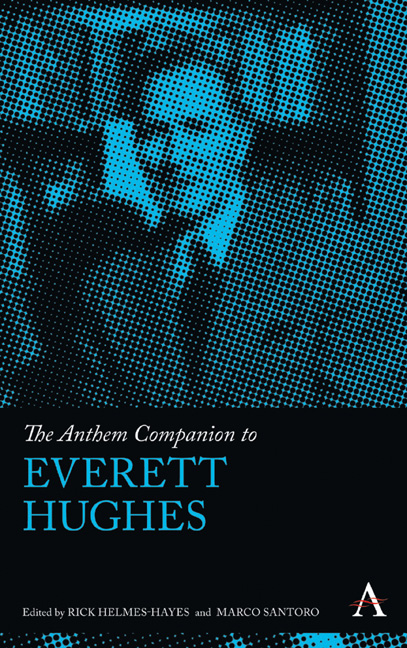Book contents
- Frontmatter
- CONTENTS
- List of Illustrations
- Foreword Everett C. Hughes, Great Teacher
- Insight through Craftsmanship: The Sociological Legacy of Everett Hughes
- Chapter One Everett Hughes and the Chicago Tradition
- Chapter Two Studying “Going Concerns”: Everett C. Hughes on Method
- Chapter Three The Natural History of Everett Cherrington Hughes: A Master of Fieldwork
- Chapter Four Everett C. Hughes: A Key Figure of the Canadian Chicago School Diaspora
- Chapter Five Everett Hughes: Notes from an Apprentice
- Chapter Six An American in Frankfurt: Everett C. Hughes's Unpublished Book on Germans after the End of the Nazi Regime
- Chapter Seven The Origins and Evolution of Everett Hughes's Concept: ‘Master Status’
- Chapter Eight Discovering the Secret of Excellence: Everett Hughes as a Source of Inspiration in Researching Creative Careers
- Chapter Nine Everett Hughes on Race: Wedded to an Antiquated Paradigm
- Notes on Contributors
- Index of Names
- Index of Subjects
Chapter Four - Everett C. Hughes: A Key Figure of the Canadian Chicago School Diaspora
Published online by Cambridge University Press: 17 June 2017
- Frontmatter
- CONTENTS
- List of Illustrations
- Foreword Everett C. Hughes, Great Teacher
- Insight through Craftsmanship: The Sociological Legacy of Everett Hughes
- Chapter One Everett Hughes and the Chicago Tradition
- Chapter Two Studying “Going Concerns”: Everett C. Hughes on Method
- Chapter Three The Natural History of Everett Cherrington Hughes: A Master of Fieldwork
- Chapter Four Everett C. Hughes: A Key Figure of the Canadian Chicago School Diaspora
- Chapter Five Everett Hughes: Notes from an Apprentice
- Chapter Six An American in Frankfurt: Everett C. Hughes's Unpublished Book on Germans after the End of the Nazi Regime
- Chapter Seven The Origins and Evolution of Everett Hughes's Concept: ‘Master Status’
- Chapter Eight Discovering the Secret of Excellence: Everett Hughes as a Source of Inspiration in Researching Creative Careers
- Chapter Nine Everett Hughes on Race: Wedded to an Antiquated Paradigm
- Notes on Contributors
- Index of Names
- Index of Subjects
Summary
Introduction
Characterizations of Everett C. Hughes’ scholarly work display an apparent paradox. On the one hand, numerous scholars have documented Hughes’ profound influence on sociology in general (Coser 1994; Drysdale 1996; Helmes-Hayes 2000, 2010) and on Canadian sociology in particular (Drysdale 1996; Drysdale and Drysdale 2013). Riesman (1983: 477), for example, describes Hughes as ‘a kind of patron saint of Canadian social science’ whose work foreshadowed several central themes within the Canadian canon. Yet Hughes spent only a relatively brief time in Canada (Shore 1987) and as Helmes-Hayes points out, ‘had no desire and made no attempt to develop followers’ (1998: 658). He neither wanted nor founded a school of thought (Fournier 1986; Riesman 1983). Nonetheless, Hughes had a major influence on sociology in general, especially in Canada, where his impact is undeniable (Riesman and Becker 2009). In this chapter we employ our concept of the Chicago School Diaspora to explain this seeming paradox. By the Chicago School Diaspora we do not mean the scattering of a people but, rather, the process whereby key ideas and symbolic representations of key figures that people associate with the Chicago School are taken up by scholars, many of whom have no formal, or even informal, relationship to the Sociology Department at the University of Chicago (Low and Bowden 2013).
Hughes’ Influence on Canadian Sociology
It is widely acknowledged that there are two major streams of Canadian sociology, one Francophone, one Anglophone. Indeed, Brym and Saint-Pierre (1997) argue that it is these two streams of thought that make Canadian sociology distinctive. While sharing some similarities, these two streams emphasize different ‘traditions’ reflecting the cultural distinctions between French and English Canada (Chekki 1987). According to Donald Whyte and Frank Vallee (1988: 2036), ‘in Québec perspectives from Europe (in particular France)’ are more influential while American sociology has had a stronger impact on English sociology in Canada. Thus, Hughes is singular in that he has had a significant influence on both French and English sociology in Canada (Chapoulie 1996; Coser 1994; Drysdale 1996; Helmes-Hayes 2000; Ostow 1985; Weiss 1996).
However, scholars differ over which of the two linguistic streams of Canadian sociology Hughes influenced most. On the one hand, some argue that Hughes’ approach to his research more ‘strongly influenced French Canadian sociologists’ (Nock 1974: 21; Shore 1987).
- Type
- Chapter
- Information
- The Anthem Companion to Everett Hughes , pp. 115 - 132Publisher: Anthem PressPrint publication year: 2016

